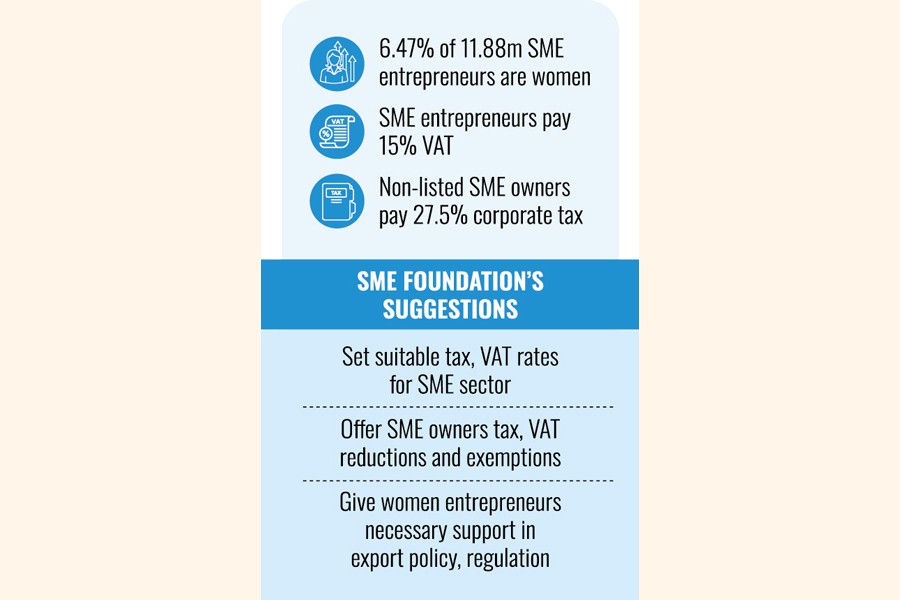
Published :
Updated :

Women entrepreneurs in the small and medium enterprise (SME) sector are facing numerous challenges due to high tax and VAT rates, complex tax systems, and lack of access to finance and infrastructure despite contributing to the country's socio-economic development, insiders said.
Other challenges include lack of skilled manpower and shortage of display centres, social and religious barriers, lack of childcare centres and market connectivity, poor networking, and lack of required subsidies and exemptions.
These are making negative impacts on productivity, innovation, capacity, and the ability of the sector to properly compete in global markets, insiders said.
They also said the existing challenges are hindering the overall SME sector's growth and competitiveness.
Besides, they claimed higher VAT and tax rates limit the ability of SMEs to innovate, diversify, and develop new products and services.
Currently, SME entrepreneurs have to pay 15 per cent VAT and non-listed SME owners have to pay 27.50 per cent corporate tax, according to the SME Foundation.
The government should take steps to provide all kinds of support, aiming to make the sector sustainable and ensure the expected growth, opined Alfaz Mia, owner of a boutique in the capital's New Market.
According to the Economic Survey 2024, about 6.47 per cent (or 0.77 million) of the country's 11.88 million SME entrepreneurs are women.
Alfaz mentioned that in recent years, women in this sector have been facing major setbacks, including higher dollar prices, continuously rising bank loan interest rates, poor law and order situation, and higher inflation, which are reducing the demand for their products.
The survival of small-capital traders is now a big challenge, he said.
SME Foundation Managing Director Anwar Hossain Chowdhury said SME entrepreneurs, especially women, are facing different barriers, including inadequate credit facility compared to their demand.
Besides, they are paying taxes and VAT at rates as high as those of big corporations. If the SME sector has to pay taxes and VAT like large business groups, its entrepreneurs will not be able to survive, he said and suggested the government set tax and VAT rates that are suitable for the SME sector.
It should offer SME owners tax and VAT reductions, including exemptions. Otherwise, small businesses will not survive, noted Mr Anwar.
He also suggested giving women entrepreneurs necessary support as they are facing various policy- and regulation-related problems in exporting their products.
The SME sector ensures women's development, economic growth, as well as gender equality and sustainable change in society. In Bangladesh, around one-third of the total entrepreneurs are women, reads a SME Foundation document.
The sector creates women's economic empowerment, self-reliance, employment opportunities, social status and leadership, impact on education and health, and decision-making rights, it added.
According to the 2013 Economic Census, the number of women-led enterprises was 0.56 million (7.21 per cent), compared to 0.10 million (2.80 per cent) in 2001 and 2003. Bangladesh ranked sixth among 54 low-income countries in terms of the number of women business owners.
The MasterCard Index of Women Entrepreneurs (MIWE) published on April 11, 2023 said 31.6 per cent of entrepreneurs in Bangladesh are women. Working in a hostile environment, women in the country are developing themselves as entrepreneurs.
The National Industrial Policy 2016 states that at least 15 per cent of loans in the SME sector must be disbursed among women entrepreneurs. The central bank has also given instructions that at least 10 per cent of refinance loans must be given to women entrepreneurs.
Taslima Miji, founder and managing director of Leatherina, said the SME sector is not getting the benefits that big businesses are getting.
Big businesses get all tax-related benefits. Small business owners initially start with a small investment, but they are brought under the purview of VAT, tax, rules, and regulations. This is a major problem of this sector, she said.
She also said, "All of us do not want tax exemption facility. We want to pay taxes. Currently, tax management is very complicated. It is important to simplify the tax and VAT system so that SME entrepreneurs pay taxes easily and smoothly."
Taslima opined that new SME entrepreneurs with potential can be given tax holidays for a certain period. The government may offer exemptions to the sector that can add value to the economy.
The entrepreneur emphasised extending the tax payment deadline and licence tenure.
The SME Foundation is continuously working to create new women entrepreneurs and integrate the existing ones into the mainstream development scene by providing comprehensive business support.
So far, it has provided training on various topics to more than 50,000 entrepreneurs, of which about 60 per cent are women.
Since its establishment, the foundation has disbursed about Tk 9.66 billion at low interest rates to about 9,500 entrepreneurs, of which at least 25 per cent are women.
Founder partner of Asix International Afsana Asif Shoma recommended developing business support systems, including training centre, to train skilled workers, developing professional designers, and ensuring raw materials' availability for the SME sector.
The industries ministry has initiated the National SME Policy 2025 formulation, aiming to boost the contribution of SMEs to the gross domestic product (GDP) to 35 per cent by 2030 from the current 27 per cent.
rezamumu@gmail.com


 For all latest news, follow The Financial Express Google News channel.
For all latest news, follow The Financial Express Google News channel.